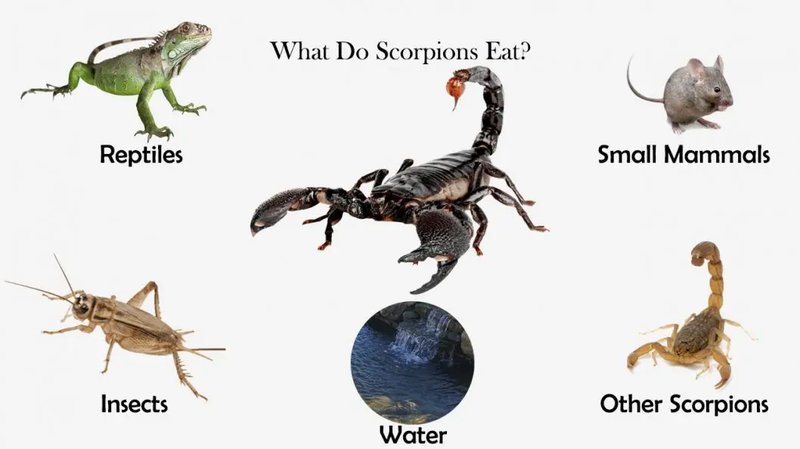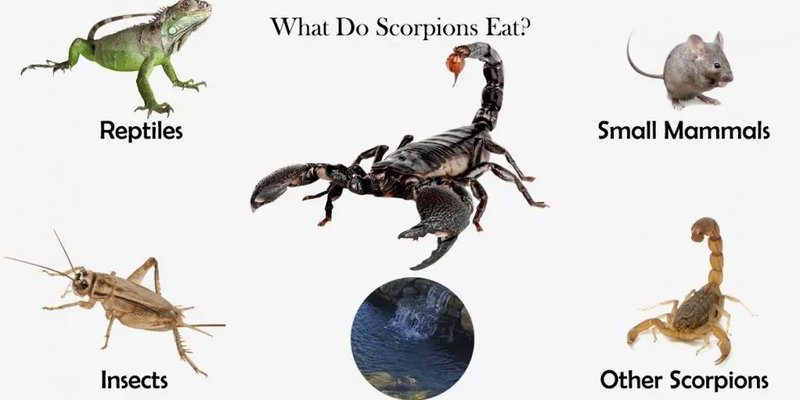
In the wild, scorpions are opportunistic predators. They’ll pretty much eat anything that fits in their claws—think insects, other arthropods, and sometimes even small vertebrates. But when they’re kept in captivity, like in a terrarium, their diet can change quite a bit. Let’s dive into the surprising world of what scorpions munch on, comparing their wild dining habits with their more pampered lifestyles in captivity.
Scorpions in the Wild
Scorpions are primarily found in deserts, forests, and grasslands, where their hunting skills really shine. They are nocturnal hunters, which means they come alive at night, using their exceptional sense of smell and their ability to detect vibrations to find food. But what do they typically feast on?
- Insects: This is the big one. Scorpions are like the ultimate insect exterminators. They primarily prey on crickets, beetles, and other small bugs. Think of them as the night-shift workers of the insect world!
- Other Arachnids: Scorpions aren’t picky eaters. They’ll also chow down on spiders and even other scorpions. It’s a bit like an unexpected family meal if they can catch one another!
- Small Vertebrates: In some cases, if a scorpion is feeling extra adventurous, they may hunt small lizards or mice. It’s not everyday dining, but they’re capable of it when the opportunity presents itself.
Scorpions have a pretty incredible hunting method. They use their pincers to grab prey, and then they sting with their tails, injecting venom to subdue their meals. This method allows them to take on prey larger than themselves, which is part of what makes them such efficient hunters.
The Diet of Captive Scorpions
Scorpions in captivity might not be out hunting under the moonlight, but that doesn’t mean they don’t have appetites! Their diet can be quite different from their wild relatives, primarily because of the availability of food and the desire for their keepers to provide a balanced diet.
- Commercially Available Insects: Many pet stores sell crickets, mealworms, and roaches specifically for feeding scorpions. These insects are readily available and help you avoid the hassle of catching your own.
- Supplemented Diet: Just like we take vitamins, captive scorpions sometimes need additional nutritional support. Sprinkling calcium or vitamin D powder on their food can help keep them healthy, especially if you’re aiming for breeding.
- Less Variety: In captivity, scorpions usually eat a more restricted diet. While they still love insects, the lack of environmental diversity means they might miss out on those occasional small vertebrates they could find in the wild.
Interestingly, captive scorpions can also adapt to different feeding routines. Some owners opt for live food, while others might use pre-killed insects. It’s all about what works best for you and your little critter.
Feeding Frequency and Amounts
Feeding scorpions is different depending on whether they’re in the wild or in your living room. In the wild, they can go days without food, relying on their hunting prowess and occasional big meals. But in captivity, it’s a bit more structured.
- Wild Scorpions: They tend to eat whenever they can catch something, which might be a few times a week if they’re lucky. When food is scarce—like during a hot dry season—they can slow down their metabolism and live off their body fat.
- Captive Scorpions: These guys usually require feeding every 5 to 7 days. Young scorpions might need food more frequently, while adults can go longer between meals. As a pet owner, it’s about finding the balance where your scorpion remains active and healthy.
And here’s the kicker: overfeeding can lead to health issues like obesity in captive scorpions. So, keeping an eye on portion sizes is crucial. It’s almost like managing a pet goldfish; you don’t want to leave them overstuffed and lethargic!
Water Requirements
While food is super important, let’s not forget about water! Scorpions are quite fascinating because they get most of their moisture from the food they eat, particularly insects. However, both wild and captive scorpions need access to water for optimal health.
- In the Wild: Wild scorpions often live in arid environments but can find moisture through their prey. Rain or dew can also provide hydration when it’s available. It’s like they’re playing a game of survival where every drop counts!
- In Captivity: You’ll need to provide a shallow dish of water for your scorpion, or you can lightly mist their habitat. Just make sure it’s shallow enough that they won’t accidentally drown in it. Remember, a little goes a long way!
Knowing how to manage their hydration can make all the difference in keeping your pet happy and healthy.
What Happens if They Don’t Get Enough Food?
Like us, scorpions have a way of telling us when they’re hungry, albeit in very different ways. If a scorpion doesn’t get enough food, you might notice some key signs.
- Decreased Activity: Scorpions are typically lively creatures, especially at night. If yours is becoming sluggish or hiding more than usual, it might be a sign they aren’t getting enough to eat.
- Weight Loss: A visibly thinner scorpion can indicate malnourishment. It’s a red flag to check their feeding schedule—maybe it’s time to switch things up.
- Stress and Health Issues: Prolonged hunger can lead to stress and susceptibility to disease. In the wild, this could mean becoming prey for another animal, but in captivity, it may lead to a shorter lifespan.
Keeping a close eye on your scorpion’s behavior and appearance can help ensure they’re living their best life.
Understanding what scorpions eat in the wild versus captivity offers us insight into how we can best care for them as pets. While their natural instincts lead them to hunt a varied diet, captivity can limit their food options. However, with the right knowledge and resources, we can mimic their wild diet closely.
So, whether you’re an avid scorpion enthusiast or just starting your journey with these cool creatures, paying attention to their dietary needs is key. Remember to keep their meals balanced and their hydration levels topped up. Your scorpion will thank you with lively antics and, who knows, maybe even a little bit of love in return!

